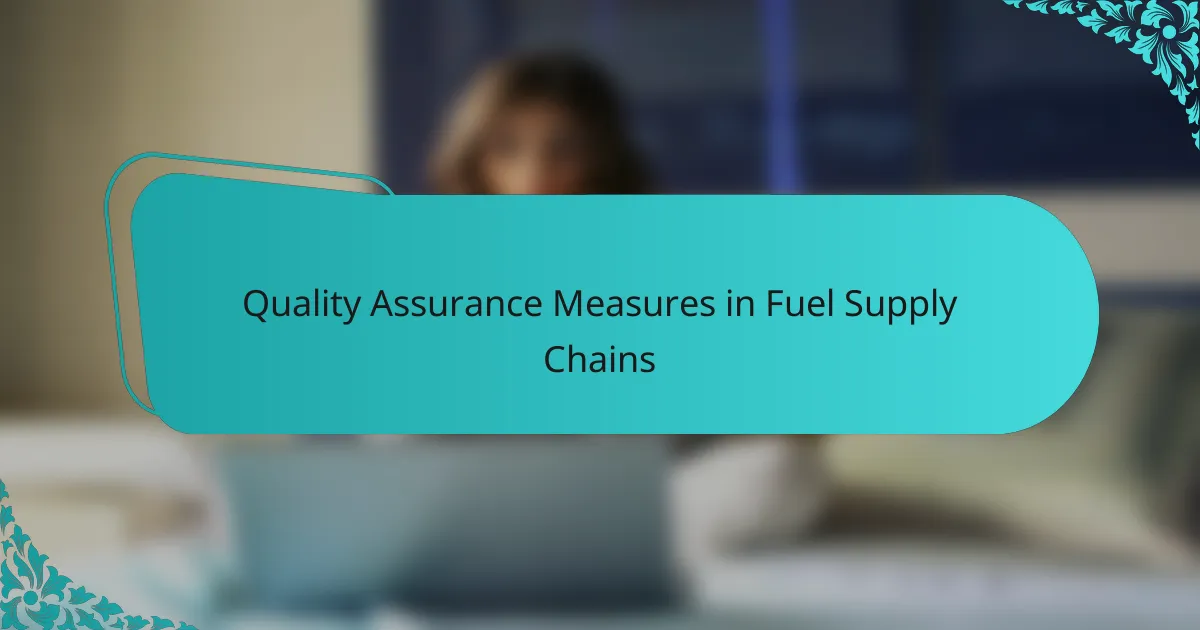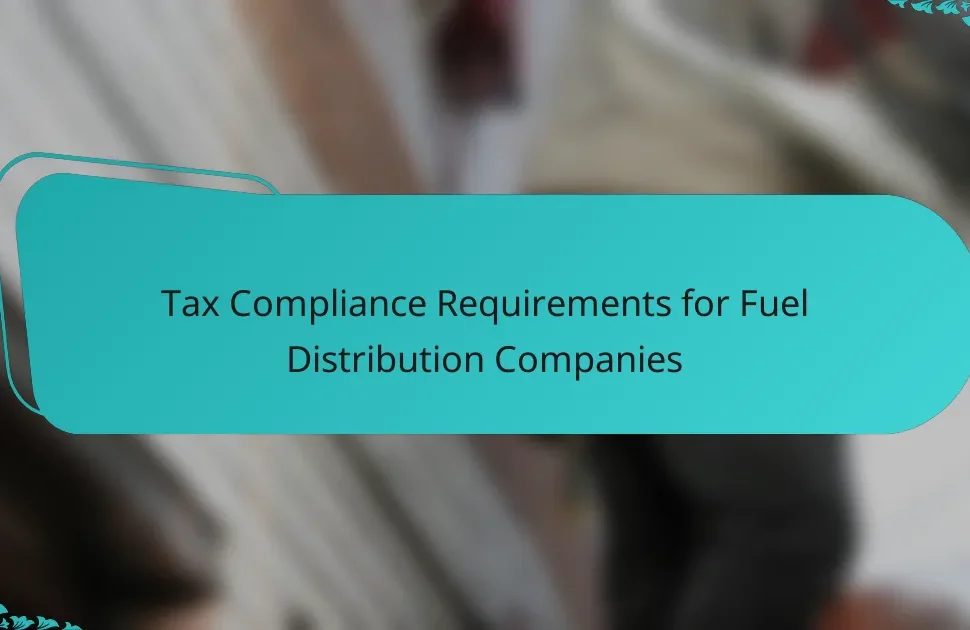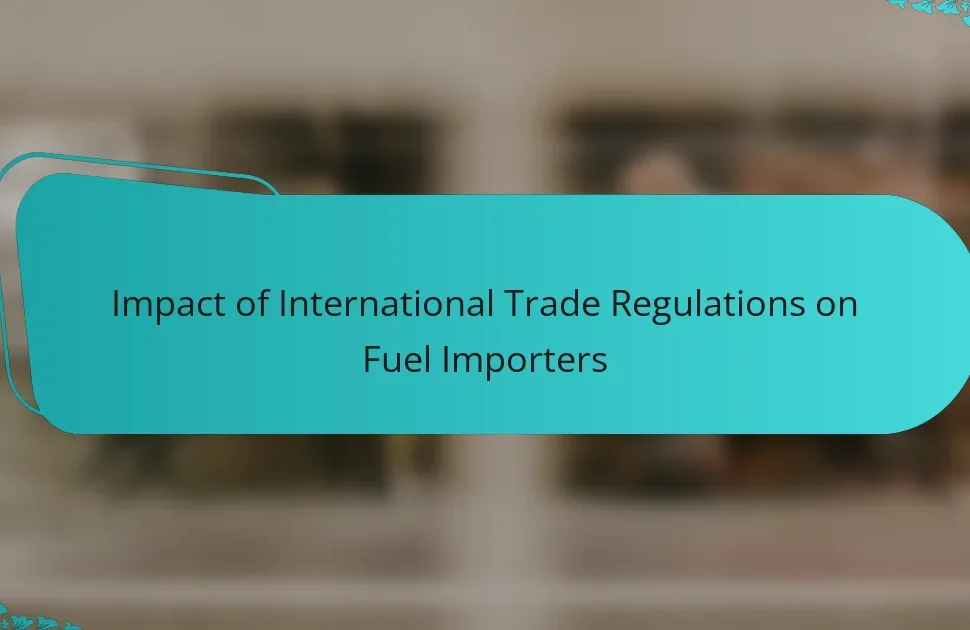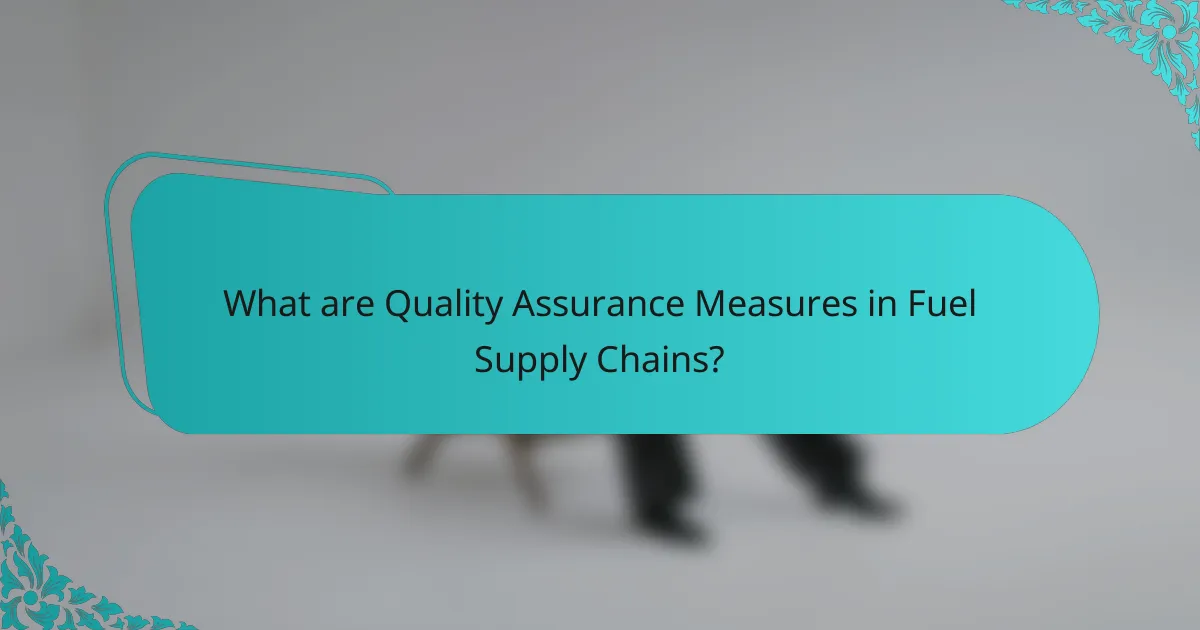
What are Quality Assurance Measures in Fuel Supply Chains?
Quality assurance measures in fuel supply chains ensure the integrity and reliability of fuel products. These measures include regular inspections and testing of fuel quality. They assess parameters such as purity, octane ratings, and contamination levels. Compliance with industry standards like ASTM and ISO is essential for quality assurance. Documentation of processes and results helps traceability and accountability. Training staff on quality protocols enhances overall effectiveness. Implementing technology for real-time monitoring can identify issues promptly. These practices collectively minimize risks and ensure customer satisfaction.
How do Quality Assurance Measures impact fuel supply chains?
Quality assurance measures significantly enhance the efficiency and reliability of fuel supply chains. They ensure that fuel meets specified quality standards, thereby reducing the risk of contamination and operational failures. Implementing these measures leads to consistent product quality, which is crucial for customer satisfaction and regulatory compliance. For instance, regular testing and inspection of fuel during storage and transportation can identify potential issues early. This proactive approach minimizes disruptions in the supply chain and lowers operational costs. Additionally, adherence to quality assurance practices can improve supplier relationships and foster trust within the industry. Overall, quality assurance measures are essential for maintaining the integrity and safety of fuel supply chains.
What are the key components of Quality Assurance Measures?
The key components of Quality Assurance Measures include process control, documentation, training, and continuous improvement. Process control ensures that operations adhere to established standards. Documentation provides a clear record of procedures and compliance. Training equips staff with the necessary skills and knowledge. Continuous improvement focuses on regularly assessing and enhancing processes. These components work together to maintain high-quality standards in fuel supply chains. Consistent application of these measures leads to reduced errors and increased efficiency.
How do Quality Assurance Measures ensure fuel quality?
Quality assurance measures ensure fuel quality by implementing systematic procedures to monitor and control fuel production and distribution. These measures include regular testing of fuel samples for compliance with industry standards. Testing assesses parameters such as octane levels, sulfur content, and contaminants. Quality assurance protocols also involve inspection of storage facilities and transportation methods. This helps prevent contamination and degradation during handling. Certification processes verify that suppliers meet regulatory requirements. Additionally, training staff on quality standards fosters a culture of accountability. These combined efforts contribute to consistent fuel quality and reliable supply chains.
Why are Quality Assurance Measures essential in fuel supply chains?
Quality Assurance Measures are essential in fuel supply chains to ensure product integrity and safety. These measures help identify and mitigate risks associated with fuel contamination and variability. Proper quality assurance ensures compliance with regulatory standards, protecting both consumers and the environment. For instance, the American Petroleum Institute (API) emphasizes the importance of quality checks to prevent hazardous incidents. Additionally, quality assurance can enhance operational efficiency by reducing waste and rework. This leads to cost savings for companies involved in the fuel supply chain. Overall, implementing robust quality assurance measures is critical for maintaining trust and reliability in fuel distribution.
What risks do Quality Assurance Measures mitigate in fuel supply chains?
Quality Assurance Measures mitigate risks such as contamination, supply disruptions, and regulatory non-compliance in fuel supply chains. Contamination can occur from impurities in fuel, which can damage engines and reduce efficiency. Quality assurance processes, like testing and monitoring, help ensure fuel purity. Supply disruptions can arise from inconsistent quality, leading to delays and financial losses. By enforcing quality standards, companies can maintain a reliable supply chain. Regulatory non-compliance risks involve penalties and legal issues. Quality assurance ensures adherence to industry regulations, minimizing these risks.
How do Quality Assurance Measures enhance customer satisfaction?
Quality Assurance Measures enhance customer satisfaction by ensuring consistent product quality. These measures include regular testing and monitoring of fuel quality. They help identify and eliminate defects before products reach customers. Consistent quality reduces the likelihood of customer complaints. Satisfied customers are more likely to remain loyal. Research shows that companies with strong quality assurance practices see higher customer retention rates. For example, a study by the American Society for Quality found that organizations with robust quality measures experience a 20% increase in customer satisfaction scores. Therefore, effective quality assurance directly correlates with improved customer experiences in fuel supply chains.

What types of Quality Assurance Measures are commonly used?
Common types of Quality Assurance Measures include inspections, testing, audits, and process control. Inspections involve examining products or services to ensure they meet specified standards. Testing assesses the performance and reliability of materials or components. Audits evaluate compliance with established procedures and regulations. Process control focuses on monitoring and managing production processes to maintain quality. These measures help identify defects and ensure consistency in fuel supply chains. Implementing these practices reduces risks and enhances customer satisfaction.
How do testing and inspection processes contribute to Quality Assurance?
Testing and inspection processes are essential components of Quality Assurance. They ensure that products meet specified standards and requirements. These processes identify defects and non-conformities before products reach the customer. Regular testing can detect issues related to performance, safety, and compliance. Inspection processes evaluate the quality of raw materials and finished products. Both methods contribute to reducing waste and improving efficiency. According to the American Society for Quality, effective testing and inspection can reduce production costs by identifying issues early. This leads to higher customer satisfaction and trust in the brand.
What types of tests are conducted in fuel quality assurance?
Fuel quality assurance involves several types of tests to ensure compliance with standards. Common tests include physical property assessments, such as density and viscosity. Chemical analysis is also conducted to evaluate the composition of fuels. Tests for contaminants, including water and particulate matter, are essential. Performance tests assess fuel efficiency and emissions characteristics. Additionally, stability tests determine how well fuels resist degradation over time. These tests are critical for maintaining fuel quality and ensuring safety in supply chains.
How often should inspections be performed in fuel supply chains?
Inspections in fuel supply chains should be performed regularly, typically at least once a month. This frequency ensures compliance with safety and quality standards. Monthly inspections help identify potential issues before they escalate. Additionally, regulatory bodies often mandate these inspections to maintain operational integrity. For instance, the U.S. Environmental Protection Agency (EPA) requires frequent assessments for fuel storage and distribution facilities. Regular inspections mitigate risks associated with fuel contamination and leaks. Therefore, maintaining a monthly inspection schedule is crucial for effective quality assurance in fuel supply chains.
What role does compliance play in Quality Assurance Measures?
Compliance ensures that Quality Assurance Measures adhere to established standards and regulations. It establishes a framework for consistent quality in fuel supply chains. Compliance helps prevent deviations that could compromise safety and performance. Regulatory bodies set specific requirements for quality assurance. Meeting these requirements is essential for operational integrity. Non-compliance can lead to penalties and operational disruptions. Studies show that compliant organizations experience fewer quality-related issues. This reinforces the importance of compliance in maintaining high standards.
What regulations govern Quality Assurance in fuel supply chains?
Quality Assurance in fuel supply chains is governed by various regulations. Key regulations include the ISO 9001 standard for quality management systems. Additionally, the American Petroleum Institute (API) has specific standards for quality assurance in petroleum products. The Environmental Protection Agency (EPA) also imposes regulations regarding fuel quality to ensure environmental safety. These regulations aim to maintain the integrity and safety of fuel throughout the supply chain. Compliance with these standards is essential for companies involved in fuel production and distribution.
How do companies ensure compliance with Quality Assurance standards?
Companies ensure compliance with Quality Assurance (QA) standards through systematic processes. They implement quality management systems (QMS) that adhere to established guidelines, such as ISO 9001. Regular audits are conducted to assess adherence to these standards. Training programs for employees are essential to maintain awareness of QA practices. Documentation of processes and results is crucial for transparency and accountability. Companies utilize feedback loops to identify areas for improvement. Continuous monitoring of quality metrics helps in maintaining compliance. These measures collectively ensure that products meet required quality standards consistently.
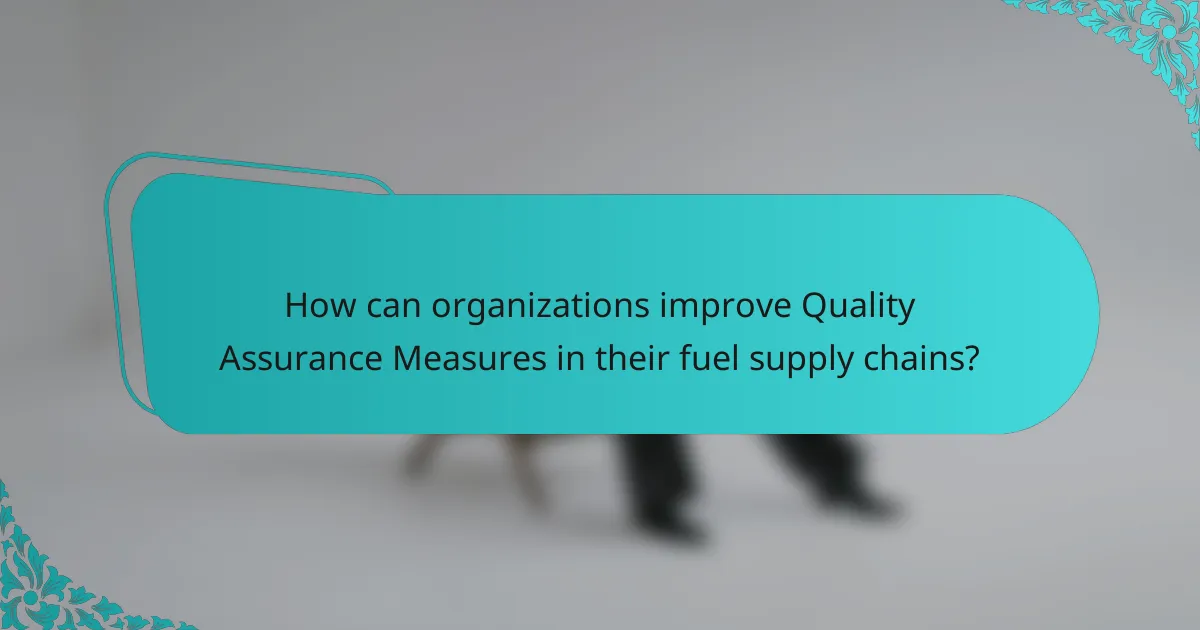
How can organizations improve Quality Assurance Measures in their fuel supply chains?
Organizations can improve Quality Assurance Measures in their fuel supply chains by implementing standardized testing protocols. These protocols ensure consistent quality assessment at various stages of the supply chain. Regular audits can identify areas for improvement and compliance with industry standards.
Training personnel on quality management systems enhances their ability to detect and rectify issues early. Utilizing technology, such as real-time monitoring systems, allows for immediate feedback on fuel quality. Collaborating with suppliers to establish quality benchmarks fosters accountability.
Additionally, conducting root cause analysis on quality failures leads to effective corrective actions. Industry data shows that organizations with robust QA measures experience fewer disruptions and enhanced customer satisfaction.
What best practices should be followed for effective Quality Assurance?
Effective Quality Assurance requires a systematic approach to ensure product quality. Implementing standardized processes is crucial for consistency. Regular training for staff enhances their ability to meet quality standards. Utilizing quality metrics helps in monitoring performance over time. Conducting routine audits identifies areas for improvement. Engaging stakeholders in the QA process fosters collaboration. Documenting procedures ensures compliance and accountability. Continuous feedback loops facilitate ongoing quality enhancements. These practices lead to improved reliability in fuel supply chains.
How can technology enhance Quality Assurance Measures?
Technology can enhance Quality Assurance measures by improving accuracy, efficiency, and traceability. Automated systems can reduce human error in data collection and analysis. Sensors and IoT devices can monitor fuel quality in real-time. Data analytics can identify trends and anomalies, allowing for proactive measures. Blockchain technology can enhance traceability and transparency in fuel supply chains. According to a study by Deloitte, companies using advanced technologies in quality assurance reported a 30% increase in operational efficiency. These advancements lead to better compliance with industry standards and regulations.
What training is necessary for staff involved in Quality Assurance?
Staff involved in Quality Assurance must undergo specific training to ensure effective performance. This training typically includes understanding quality standards and methodologies. Familiarity with quality management systems is crucial. Staff should also receive training in data analysis and reporting techniques. Knowledge of regulatory compliance is essential in the fuel supply chain. Training in risk management and problem-solving skills enhances effectiveness. Continuous professional development is important for staying updated with industry standards. Organizations often provide on-the-job training and workshops for practical experience.
What common challenges do organizations face in implementing Quality Assurance Measures?
Organizations face several common challenges in implementing Quality Assurance Measures. One major challenge is the lack of standardized processes. Many organizations do not have uniform procedures, leading to inconsistencies in quality. Another challenge is insufficient training for staff. Employees may not fully understand quality standards or how to apply them effectively. Additionally, organizations often struggle with resource allocation. Limited budgets can hinder the implementation of comprehensive quality measures. Communication barriers also pose a significant issue. Misalignment between departments can result in misunderstandings about quality expectations. Finally, resistance to change can impede progress. Employees may be hesitant to adopt new practices or technologies that enhance quality assurance. These challenges collectively impact the effectiveness of quality assurance in fuel supply chains.
How can organizations overcome these challenges?
Organizations can overcome challenges in quality assurance measures in fuel supply chains by implementing robust monitoring systems. These systems can track fuel quality at every stage of the supply chain. Regular audits and inspections can identify potential quality issues early. Training staff on quality standards ensures adherence to best practices. Collaborating with suppliers can enhance transparency and accountability. Utilizing technology, such as blockchain, can provide traceability of fuel quality. Adopting standardized quality assurance protocols can streamline processes and reduce variability. Investing in advanced testing equipment can improve detection of contaminants. These strategies collectively enhance the reliability and safety of fuel supply chains.
What resources are available for improving Quality Assurance in fuel supply chains?
Resources available for improving Quality Assurance in fuel supply chains include industry standards, training programs, and technological solutions. Industry standards such as ISO 9001 provide frameworks for quality management systems. Training programs enhance employee skills in quality assurance practices. Technological solutions like automated monitoring systems ensure compliance with quality standards. Additionally, data analytics can identify inefficiencies in the supply chain. Collaboration with regulatory bodies also aids in maintaining quality assurance. Research from the American Society for Quality highlights the importance of continuous improvement in quality processes. These resources collectively contribute to enhanced quality assurance in fuel supply chains.
What are the future trends in Quality Assurance Measures for fuel supply chains?
Future trends in Quality Assurance Measures for fuel supply chains include increased automation and digitalization. Automation will enhance process efficiency and reduce human error. Digital tools will enable real-time monitoring of fuel quality and supply chain integrity. Blockchain technology is expected to improve traceability and transparency in fuel transactions. Artificial intelligence will aid in predictive analytics for quality assurance. Enhanced regulatory compliance will drive stricter quality standards across the supply chain. These trends aim to ensure safety, reliability, and sustainability in fuel supply chains.
How is sustainability influencing Quality Assurance practices?
Sustainability is significantly influencing Quality Assurance (QA) practices by integrating environmental considerations into quality management systems. Organizations are adopting sustainable practices to minimize environmental impact. This includes reducing waste and energy consumption during production. Quality Assurance now emphasizes lifecycle assessments to evaluate the sustainability of products. Sustainable sourcing of materials is becoming a standard requirement in QA protocols. Regulatory frameworks increasingly demand compliance with environmental standards, affecting QA processes. Companies that prioritize sustainability often report improved brand reputation and customer loyalty. Research indicates that firms with strong sustainability practices achieve better operational efficiency. This shift towards sustainability in QA is reshaping industry standards and expectations.
What innovations are emerging in Quality Assurance technology?
Emerging innovations in Quality Assurance technology include automation, AI-driven analytics, and blockchain integration. Automation streamlines testing processes, reducing human error and increasing efficiency. AI-driven analytics enhance data interpretation, enabling predictive quality assessments. Blockchain integration ensures transparency and traceability in supply chains. These advancements lead to improved compliance and risk management. Recent studies indicate that companies adopting these technologies see a 30% reduction in quality-related issues. The integration of these innovations is transforming Quality Assurance practices across various industries.
What practical tips can organizations apply to enhance Quality Assurance Measures?
Organizations can enhance Quality Assurance Measures by implementing standardized procedures. Standardization ensures consistency in processes and reduces variability. Regular training for staff on these procedures is essential. Trained personnel are more likely to adhere to quality standards.
Utilizing technology for real-time monitoring can significantly improve quality assurance. Real-time data helps identify issues promptly. Conducting regular audits and reviews of quality processes is also crucial. These audits can uncover areas needing improvement.
Establishing clear communication channels among teams fosters collaboration. Collaboration enhances problem-solving and quality outcomes. Finally, engaging with stakeholders for feedback can provide insights into quality perceptions. Stakeholder feedback is valuable for continuous improvement.
Quality Assurance Measures in Fuel Supply Chains ensure the integrity and reliability of fuel products through systematic inspections, testing, and compliance with industry standards. Key components include process control, documentation, training, and continuous improvement, which collectively mitigate risks such as contamination and operational failures. The article discusses the impact of these measures on customer satisfaction, regulatory compliance, and operational efficiency, while also exploring common challenges organizations face and the emerging trends in technology and sustainability that influence quality assurance practices.
